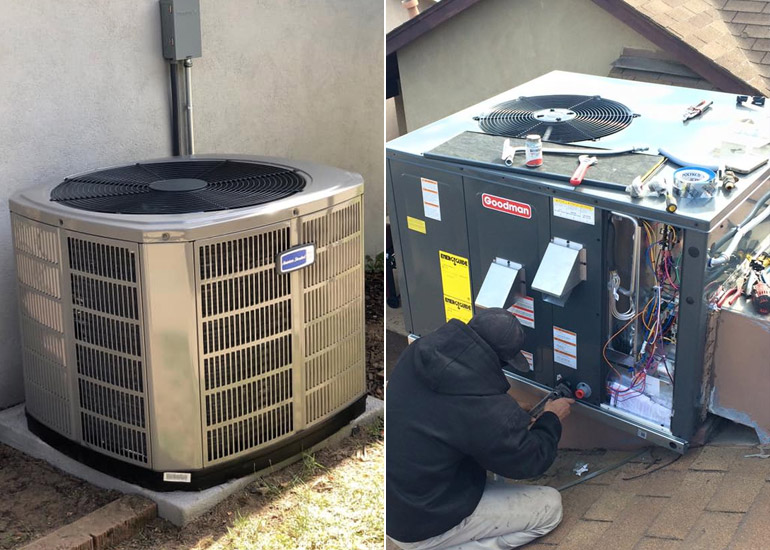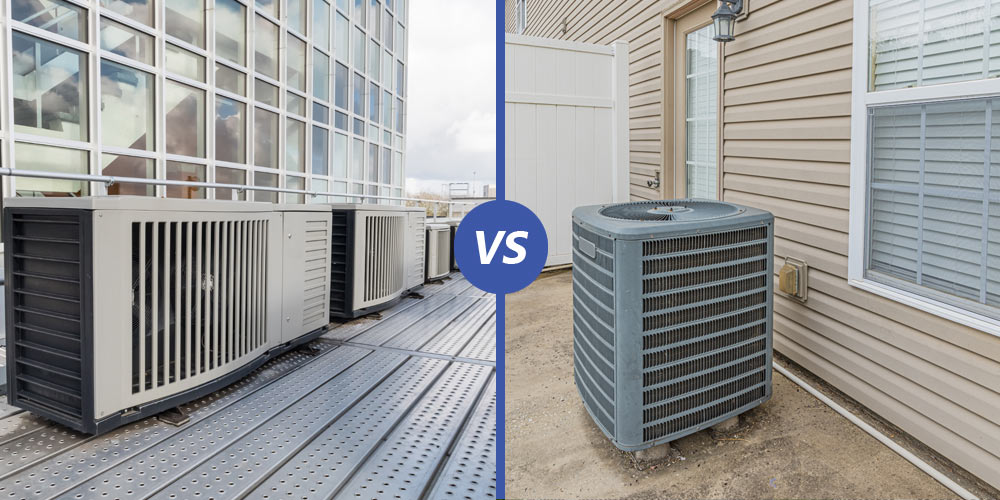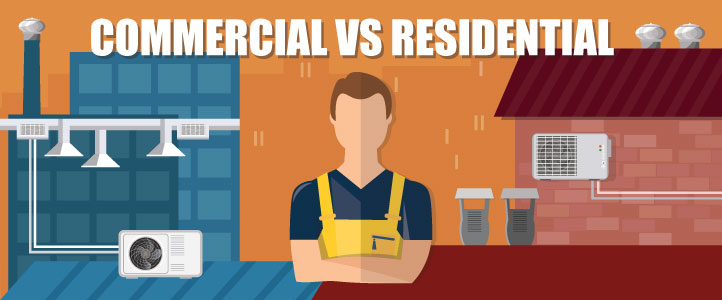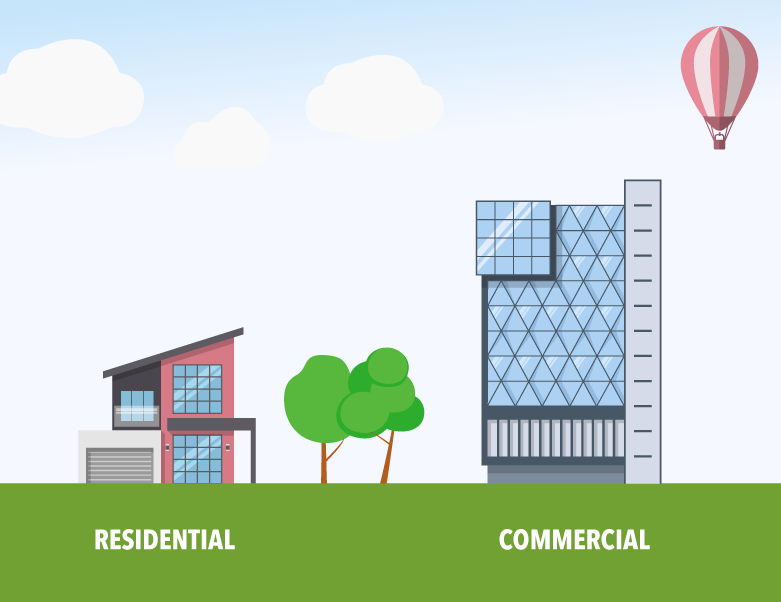Your search for understanding the real differences between residential and commercial HVAC systems ends here! With this handy guide, it becomes easy as pie to comprehend the intricate disparities that separate the two. The article enlightens you on every essential detail from functional variations, design complexity, to maintenance necessities, all aimed at making your quest for HVAC knowledge a breeze. To ensure you’re not left out in the cold (or heat), Diamond Air Design, a reputable HVAC company located in Pensacola, FL, with proven expertise, is always ready to assist.
Understanding HVAC
Understanding the HVAC system is crucial to achieving optimal functionality in your living or workspace. HVAC stands for Heating, Ventilation, and Air Conditioning. It’s a system that provides thermal comfort and satisfactory indoor air quality in a building.
Definition of HVAC
Heating, Ventilation, and Air Conditioning (HVAC) represents any system that is used to regulate the internal conditions of a building or a house. Generally, an HVAC system is designed to control the environment in which it works, making it comfortable for you by adjusting the air temperature and humidity, and providing fresh air.
Importance of HVAC systems
Maintaining optimal living conditions in a building requires regular and satisfactory temperature control. HVAC systems are crucial for comfort as it allows you to rest easy in a mildly hot summer or a chilly winter. Not only do they provide a comfortable environment, but HVAC systems also work to improve the quality of indoor air, reducing the presence of allergens and other harmful particles.
Various components of an HVAC system
Every system varies according to the specific needs of a building, but there are fundamental components found in every HVAC system. These include: an exhaust outlet, ducts spread through the building, an air supply inlet, outlets in every room for the expulsion of the air, an air filter outside the supply inlet, and the ventilation component for the expulsion of used air.
Overview of Residential HVAC
Residential HVAC systems mainly focus on maintaining comfortable living conditions in a home, aiming for health and comfort over all else.
Special features of residential HVAC systems
Residential HVAC systems are generally smaller than their commercial counterparts. They focus primarily on cooling or heating air and distributing it throughout the house. These systems are designed to accommodate fewer people and are often very quiet during operation to ensure a comfortable home environment.
Operational principles of residential HVAC
A residential HVAC system operates by creating a balance between outdoor air pressure and indoor air pressure. By manipulating these pressures through the expulsion of air from your home and the subsequent intake of fresh air from outside, the system manages to maintain a steady and comfortable indoor climate.
Common models and types of residential HVAC
Traditional HVAC systems for residential buildings include split systems, ductless mini-split, furnaces, and hybrid split systems. The best choice depends largely on the climate in your area and the size of your home.

This image is property of www.irishheatandair.com.
Overview of Commercial HVAC
Unlike residential systems, commercial HVAC systems focus more on efficiency and adaptability, to accommodate a larger number of people and a more extensive building space.
Unique features of commercial HVAC systems
Commercial HVAC systems are complex due to the larger areas they cover. Thus, placement and power consumption are integral factors that condition the operation of these systems. They are typically located on the roofs of buildings to save space and are larger and more powerful than residential systems.
Operational principles of commercial HVAC
Commercial HVAC systems operate on a larger scale and have to keep up with the varying needs of different rooms within a building. They distribute air through a network of ducts installed throughout the building, maintaining the indoor climate as needed.
Most used models and types of commercial HVAC
There are different types of commercial HVAC systems, each designed to suit a specific type of building. These systems include single-zone units, multiple zone units, humidity control HVAC systems, and radiant HVAC systems.
Size & Capacity Differences
The sizes and capacities of residential and commercial HVAC systems differ significantly due to their different operational requirements.
Size comparison between residential and commercial HVAC
Residential HVAC systems are usually smaller and easier to install because they are designed to heat or cool smaller areas. Conversely, commercial HVAC systems are larger and more powerful, capable of managing larger areas with vastly different requirements.
Capacity demands for residential HVAC
In residential spaces, the HVAC capacity is predominantly determined by the size of the house, number of rooms, number of family members, and the surrounding climate.
Capacity demands for commercial HVAC
Commercial HVAC capacities are determined by the size and type of the building, the number of rooms or offices, the number of employees and customers, and the equipment used within the building.

This image is property of www.conejovalleyair.com.
Installation Differences
Installation processes differ between residential and commercial HVAC systems due to distinct structural and capacity requirements.
Residential HVAC installation process
In most cases, installing a residential HVAC system involves setting up a condenser outdoors and an air handler indoors. Ductwork is then installed to circulate the conditioned air throughout the home.
Commercial HVAC installation process
Commercial HVAC systems, because of their size and complexity, require a more involved installation process. Typically, the system is installed on the roof of the building, and extensive ductwork is required to circulate the conditioned air throughout the building.
Key installation differences
The key difference between residential and commercial HVAC installations lies in the system’s size, complexity, and implementation method. Residential HVAC systems are smaller and require less physical space for installation, whereas commercial HVAC systems are larger and more complex, requiring dedicated areas for setup.
Maintenance & Servicing Differences
Different HVAC systems require different levels of maintenance and servicing.
Residential HVAC maintenance needs
Residential HVAC systems are simpler, hence less frequent maintenance is required. However, regular servicing is necessary to ensure optimal functionality and a longer lifespan.
Commercial HVAC maintenance requirements
Commercial HVAC systems, due to their complexity and size, require more frequent and intensive maintenance. Regular inspections and timely repairs are crucial to prevent possible malfunctions and maintain optimal performance.
Difference in maintenance procedures
Residential HVAC systems usually require annual servicing, while commercial systems often require maintenance several times a year. The complexity of commercial HVAC systems makes them more prone to potential issues, necessitating proactive and frequent maintenance.

This image is property of www.hvacschool.org.
System Complexity
The complexity of an HVAC system often dictates its functionality and maintenance needs.
Complexity level of residential HVAC
Residential HVAC systems are less intricate. They are designed with simplicity and user comfort in mind, making them easier to operate and maintain.
Complexity level of commercial HVAC
The complexity of commercial HVAC systems is significantly higher. These systems need to uphold a certain air quality and temperature in larger spaces and accommodate varying requirements across different areas within the building.
Implications of system complexity
More complicated systems generally dictate a greater upfront cost, higher maintenance requirements, and advanced control mechanisms. It’s important to keep in mind that while these complexities may lead to higher costs and more intensive upkeep, they cater to specific needs that simpler systems may not.
Energy Usage & Efficiency
Energy usage and efficiency are critical factors to consider when choosing an HVAC system.
Energy usage in residential HVAC
Residential HVAC systems consume less energy due to their smaller sizes and the constrained spaces they cool or heat. Nevertheless, energy consumption varies based on the specific model and how effectively it operates.
Energy usage in commercial HVAC
On the other hand, commercial HVAC systems consume more energy due to their complexity, size, power, and operational requirements.
Comparing energy efficiency
While commercial HVAC systems use more energy, they don’t necessarily do so inefficiently. Modern commercial HVAC systems come with advanced features that optimize energy use to manage larger spaces effectively.

This image is property of iceblast.com.au.
Cost Differences
Choosing the right HVAC system also entails considering the costs involved.
Cost of residential HVAC systems
Residential HVAC systems generally cost less due to their smaller size and simpler design. However, the model type and brand can significantly influence the price.
Cost of commercial HVAC systems
Commensurately, commercial HVAC systems cost more due to the complexity and size of these systems. Customizations and additions to meet specific requirements can also increase the price.
Factors determining the price differences
The price differences mainly stem from the system’s size, installation requirements, operational complexity, and maintenance requirements. Commercial HVAC systems, being larger and more complex, necessitate higher upfront costs and maintenance expenses.
Choosing the Right HVAC System
Choosing the right HVAC system is critical for ensuring comfortable and healthy indoor air environments.
Factors to consider when selecting a residential HVAC
Choosing a residential HVAC system requires considering the size and design of your house, the local climate, and your budget. Also, consider the system’s energy efficiency and maintenance needs.
Factors to consider when choosing a commercial HVAC
The size and design of the building, the number of employees or inhabitants, and the working hours are some of the key considerations when choosing a commercial HVAC system. The system’s energy efficiency, maintenance requirements, and the local climate should also inform your decision.
Using Diamond Air Design for HVAC services
When deciding on the right HVAC, Diamond Air Design, with their strategic location at 200 Terry Dr, Pensacola, FL 32503 and a contact number (850) 753-2795, is an excellent choice. Their ability to design, implement, maintain, and repair HVAC systems, combined with their friendly, efficient, and reliable customer service, ensures that all your HVAC needs are well cared for.
The post The Real Differences: Residential Vs. Commercial HVAC appeared first on Diamond Air Design.




